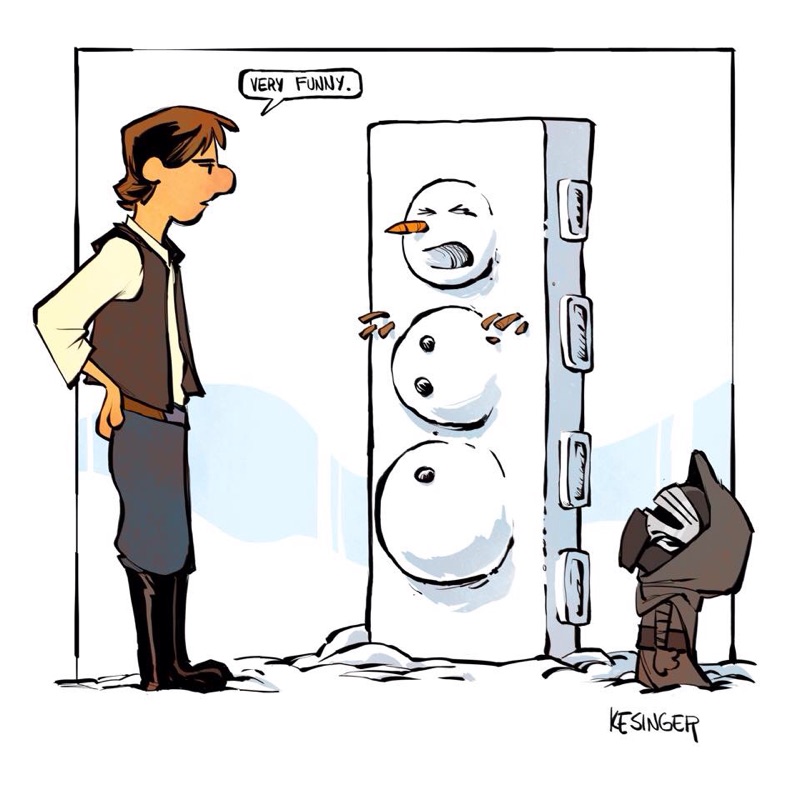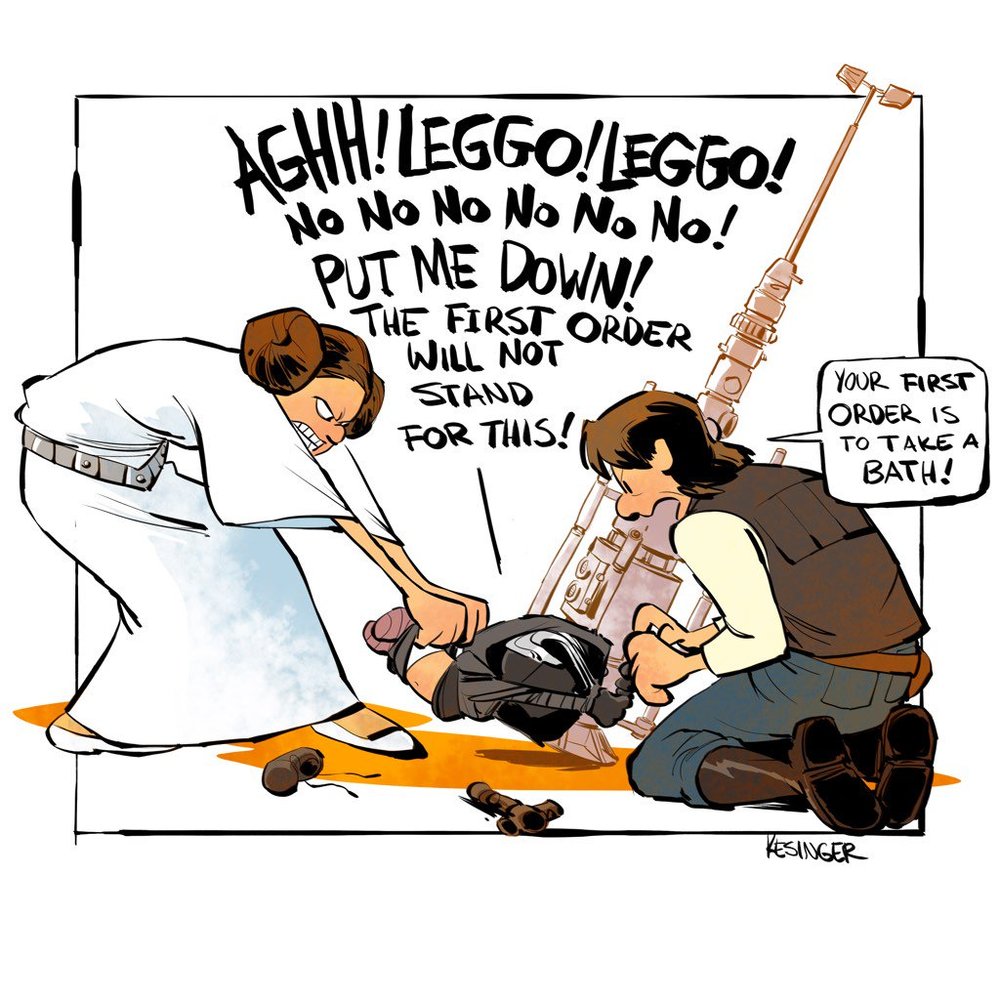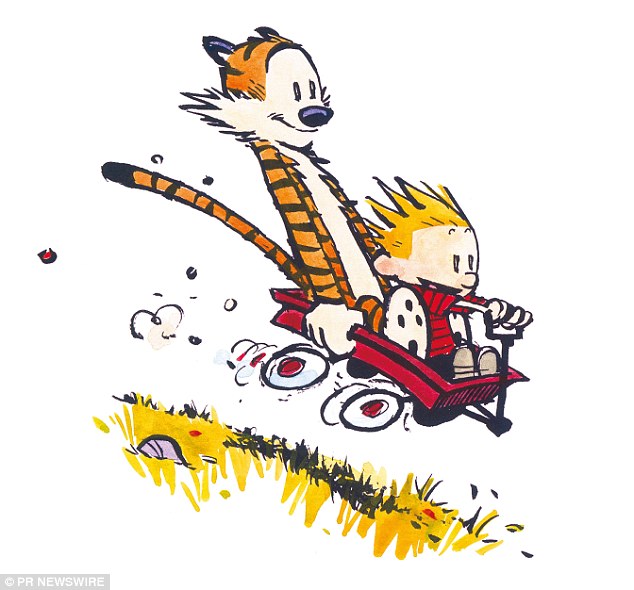You Can’t Copyright Style
/Shortly after Star Wars: The Force Awakens came out, something happened that no one could have possibly predicted: people started making fan art. Shocking I know, but in a world where Donald Trump is the leading Republican candidate for President, I’m not sure anything’s a surprise anymore. Anyway, among those artists was Disney and Marvel illustrator Brian Kesinger. But Kesinger wasn’t interested in your run of the mill fan art. He wanted to do something special. The result of his labor: a series of adorable illustrations of Kylo Ren, Han Solo, Leia, and Darth Vader from The Force Awakens done in Bill Watterson’s inimitable style. Kesinger not only nailed the famed Calvin and Hobbes look, he also nailed Watterson’s voice. Here are a few.
The rest can be seen on his Instagram. When I saw them, I was amused but thought little else. Just more grist for the Star Wars mill. But then I read a few comments sections (NEVER DO THAT!) and one question kept popping up: How is this not copyright infringement?
Well, it might be and it might not be.
Let’s get this out of the way first: a lot of these drawings, no matter how similar they look to Watterson’s illustrations, are not derived from his work. They merely call to mind his voice and style, but are wholly invented by Kesinger in terms of content and composition. In those cases, there’s probably* no infringement. Copyright law protects finished works of art. It does not protect things like facts, ideas, procedures, or an artist’s style, no matter how distinct. So even though Kesinger’s drawings imitate Watterson, he’s not copying specific pieces of Watterson’s work, which means they probably aren’t infringing. In fact, they would likely fall under fair use because of their transformative qualities (i.e. Kesinger is commenting on the playfulness of Calvin and Hobbes by inserting Star Wars characters into the mix. Or he’s commenting on the seriousness of Star Wars characters by recasting them as Calvin and Hobbes. Either way, he’s commenting on something by using something else).
Why isn't style protected by copyright? Well for one thing, there's some case law telling us it isn't. In Steinberg v. Columbia Pictures, the court stated that style is merely one ingredient of expression and for there to be infringement, there has to be substantial similarity between the original work and the new, purportedly infringing, work. In Dave Grossman Designs v. Bortin, the court said that:
"The law of copyright is clear that only specific expressions of an idea may be copyrighted, that other parties may copy that idea, but that other parties may not copy that specific expression of the idea or portions thereof. For example, Picasso may be entitled to a copyright on his portrait of three women painted in his Cubist motif. Any artist, however, may paint a picture of any subject in the Cubist motif, including a portrait of three women, and not violate Picasso's copyright so long as the second artist does not substantially copy Picasso's specific expression of his idea."
The courts are essentially saying that "expression" is a combination of a variety of factors: composition, content, style, framing, color, narrative, artistic intent, etc. Together, they add up to create the expression of a particular work, and it's the totality of all those factors that earns copyright protection. One particular piece of that expression taken alone - like style - is not enough to warrant protection. Style tells us nothing of the artist's inspirations or motivations. It tells us nothing about what the composition of the work will be or what the artist will say. It gives us only the basic outline of what a work of art may look like, but only then it'll be a guess. An artist's style may tell us about the artist, but not about the work.
Looking through that lens, we can see that several of Kesinger's drawings don’t just recall Watterson’s style, they essentially copy the entire work, simply swapping out Calvin and Hobbes with characters from Star Wars. These drawings are noteworthy in their similarity to the originals.
As you can see, they’re close enough to the originals that they could be considered “derivative works.” A derivative work is an adaptation, translation, or modification of an existing copyrighted work and the right to make a derivative work rests solely with the author, unless conveyed away. That’s something we know Watterson hasn’t done.
So it’s entirely possible that Kesinger could be liable for copyright infringement for these four drawings. But copyright infringement doesn't exist in a vacuum. There has to be a lawsuit by the infringed party and there has to be harm associated with the unauthorized use. For Kesinger to be held liable, Watterson would have to sue him... something he hasn’t seemed keen on in the past. I mean if he hasn’t sued over those horrible “Calvin peeing” stickers, I don’t know what would force his hand. It's also not clear that Kesinger is profiting from these illustrations. A quick look at his Etsy shop shows that none of the prints are for sale, which could cut against any infringement case against him.
In any case, short of publishing a book of these, I think Kesinger is in the clear. And besides, we’re two years away from the next movie in the saga. That’s plenty of time for the public to lose interest in these and move onto something else. Like maybe a mashup of Garfield and The Avengers?
* I say “probably” because, like everything in the law, nothing is set in stone until it is, and even then maybe not. Assuming Watterson did sue, one court may find these similar enough to warrant infringement and another might not. It depends a great deal on the leniency of the judge or jury, the soundness of the arguments of each side’s attorney, and luck.




















